War Time Emergency Ships to Modern Bulk Fleet
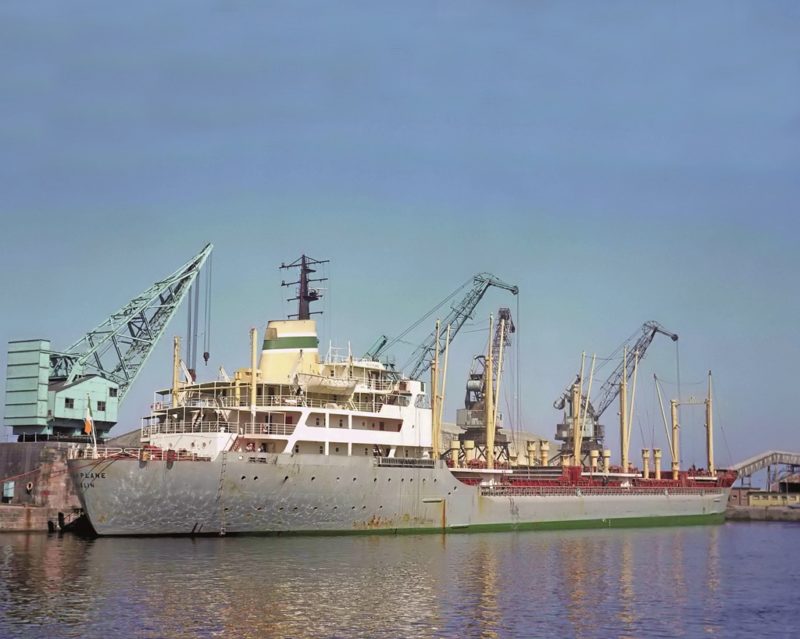
The Republic of Ireland shipping fleet was very small on the outbreak of war between Britain and Germany on 3rd September 1939 and had no deep-sea ships and stood at only 56 coastal vessels including 14 Arklow schooners and 33 small coastal cargo ships. The reasons for this were the Irish War of Independence (1919-1921), the Irish Civil War (1921-1922), a policy of self-sufficiency, the world trade depression (1929-1935), a lack of investment, and Irish Government neglect. Ireland relied on British and Allied ships including Greek, Norwegian, Estonian, Brazilian, Argentinean, Swedish and Finnish deep-sea ships, and only 5% of imports in 1939 were carried in Irish flagged ships.
The Government of Ireland immediately declared itself neutral of all hostilities and found itself completely alone as never before, including the policy of not allowing damaged British ships of torpedo and bombing attacks from entry to all of its ports. In 1940, the food needs of the Irish Republic amounting to 400,000 tons were supplied by British and Allied ships to their great cost in terms of ships and loss of seafarers. The Republic of Ireland in return sent much smaller amounts of potatoes and other vegetables and other types of cargo to British ports.
However, Winston Churchill in a letter writing to the American President Roosevelt in mid December 1940, made it abundantly clear that this policy of supplying foodstuffs to Ireland was to about to come to an end. This information was reported in the Irish Press in mid January 1941, and took effect quickly with only seven deep-sea ships of non-Irish nationality arriving with cargoes between April 1941 and June 1942. The Irish Government realised that they needed to be much more independent of British supplies and become self-sufficient. In February 1941, Sean Lemass, the Minister for Supplies stated ‘The creation of an Irish Mercantile Marine was necessary, as it was as important for the national safety of the country as was the Irish Army’.
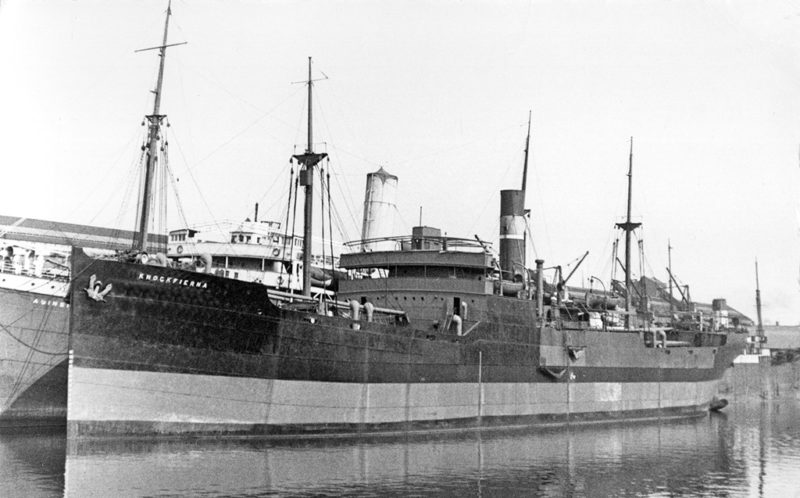
CREATION OF ISL
On 21st March 1941 at a meeting in Earlsfort Terrace in Dublin, Irish Shipping Limited was formed as a company majority owned by the State, which held 51% of the shares, together with Grain Importers Ireland Ltd. holding 43.75% of the shares, with the remaining 5.25% held equally by the three largest Irish shipping companies, namely:-
- Limerick Steamship Co. Ltd.
- Palgrave Murphy Ltd.
- Wexford Steamships Ltd.
Limerick Steamship Co. Ltd. had been formed in 1893 for several services from Limerick, Tralee, Galway, Ballina, Sligo and Waterford to Liverpool, Bristol, London, Rotterdam, Amsterdam, Ghent and Hamburg. The company used steamers from its inception, with Ardnamult of 1,123 grt and built in 1883 for the Waterford Steamship Co. Ltd. as its first ship. The company was operating a fleet of eight steamers in 1920, ten steamers in 1932 and six steamers in 1941. Included in the inter-war fleet were two large deep-sea tramps in Knockfierna of 5,285 grt and 8,350 dwt built in 1919 as the standard tramp War Poppy, and Kilcredane of 6,380 grt and 9,650 dwt. This latter pair were the only Irish owned deep-sea tramps of the inter-war years, and would have been the only pair of Irish State owned deep-sea tramps if a State owned company had been set up during that period.
Knockfierna was purchased in 1919 and was the first merchant fleet to show the new Irish tricolour in Australian waters in December 1924 when she arrived at Sydney with Texan case oil. She was sold to Greece in 1935 after a long period of lay-up in Cork harbour during the Depression. Kilcredane had been acquired by the Limerick Steamship Co. Ltd. in unusual circumstances in 1922 as Mogilev from the Russian Volunteer Fleet after she had lain at a British port during the Bolshevik Revolution when a dispute arose over her debts and she was seized by the British Government. She had been built in 1911 on the Tyne by the Armstrong, Whitworth & Co. Ltd. yard at Walker, and after a series of legal moves, she was eventually sold to Ireland as the largest vessel in the Limerick fleet until she was sold to Norway in 1931.
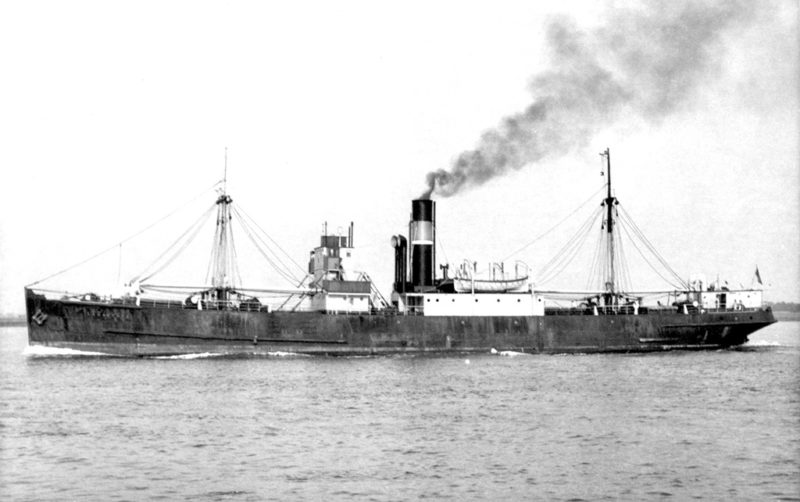
Limerick Steamship Co. Ltd. had other interesting ships, with Inishbofin of 3,042 grt and 4,268 dwt built in 1888 by Connell on the Clyde to bring home cargoes of iron ore from Spain, as well as the coastal steamers Cahiracon of 1,871 grt built in 1902, Rynanna of 1,300 grt built in 1909, Luimneach of 1,074 grt built in 1915, Clonlara of 1,203 grt built in 1926, and Lanahrone of 1,221 grt built in 1928.
The company had lost four steamers during World War I:-
Oola of 2,494 grt and built in 1891 as Highlander and captured and sunk with bombs on 26th October 1916 22 miles NNE of North Cape of Norway by U-56 while on a voyage from the Tyne to Archangel with coal.
Coonagh ex Almagro of 1,412 grt built in 1904 and torpedoed and sunk on 15th March 1917 by UC-16 in the English Channel while on a voyage from the Tees to Rouen with pig iron, ten crew lost including her Master.
Islandmore of 3,046 grt built as Kylemohr in 1909 and captured and sunk by gunfire on 3rd June 1917 in the Mediterranean 20 miles NW of Cape Falcon by U-33 while on a voyage from Barry to Gibraltar and Malta with a cargo of coal, two crew lost, Master taken prisoner.
Aylevarroo of 908 grt and built as Lillie in 1903 and torpedoed and sunk on 8th October 1917 by U57 off the Ballycotton Islands 25 miles East of Cork while on a voyage from Liverpool to Tralee and Limerick with general cargo, 20 crew lost including her Master.
The Limerick Steamship Co. Ltd. lost five ships to enemy action during World War II:-
Maigue lost on 4th January 1940 stranded on Cape Clear, refloated and broken up in Dublin
Rynanna lost when she grounded on the Goodwin Sands on 21st January 1940
Luimneach lost in the Western Approaches on 4th September 1940, torpedoed by U-46
Clonlara lost on 22nd August 1941, torpedoed by U564 (Suhren) off Portugal
Kyleclare lost on 23rd February 1943 torpedoed by U-456 to South West of Ireland
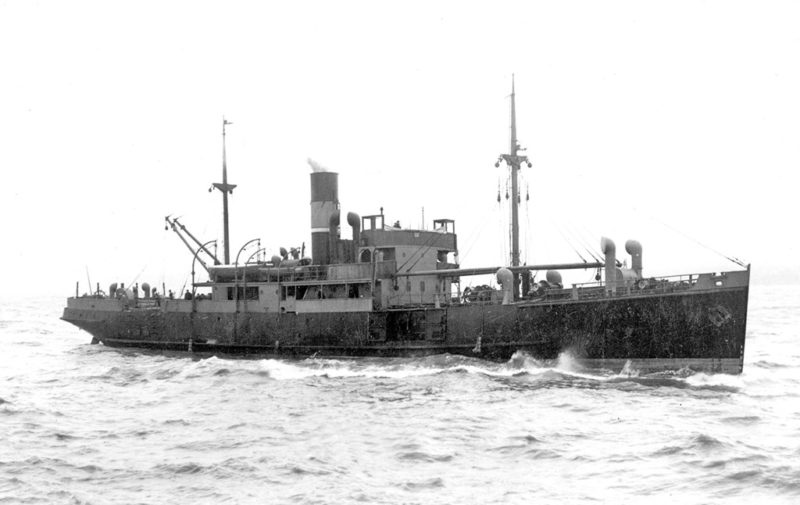
Palgrave Murphy Ltd. of Dublin began as shipowners in the 1830s by the Palgrave family and were joined by the Murphy family in the 1870s. They named all of the ships after the ports they served e.g. Hamburg, Antwerp and Lisbon, and they were also managers of the Dublin and Silloth Steamship Co. Ltd. Until World War I they operated their fleet of steamers with a prefix of ‘City’ between Ireland and many ports in Britain and the Continent, losing two ships during that war.
The fleet had been built back up to three steamers by 1932 in City of Antwerp, City of Cork and City of Dublin, trading from Eden Quay in Dublin. This trio were used by the Head Line of Belfast as their own ships from 1932 until April 1934, maintaining separate time and voyage books for them.
The Dublin company was reorganised on 25th April 1934 as the Saorstat & Continental Steamship Co. Ltd. to own the ‘City’ fleet, and three steamers of this fleet were lost during World War I :-
City of Limerick lost to enemy action on 15th July 1940, set on fire by aircraft bombs when 100 miles from Ushant while on a voyage from Carthagena to Liverpool with 16,430 cases of lemons. Two crew were killed with 22 survivors from the drifting derelict vessel.
City of Bremen lost to enemy bombs on 2nd June 1940, to the south west of Ireland while on a voyage from Lisbon to Holyhead with one thousand tons of wheat, all 22 crew saved.
City of Waterford lost to a collision in convoy on 19th September 1941. She had been built at Belfast in 1879 as Fair Head for the Ulster Steam Ship Company, and was renamed when purchased by Palgrave Murphy Ltd. in 1934. Capt. Thomas Aplin of Sandymount in Dublin and his ship joined convoy OG74 at Milford Haven in September 1941. The naval escort included the escort aircraft carrier Audacity, rescue ship Walmer Castle, a destroyer, sloop and six corvettes. All 22 merchant ships of the convoy sailed for Gibraltar, but City of Waterford sank after a collision with the Dutch tug Thames. All of her crew were rescued and transferred to Walmer Castle, which was also sunk the next day by aircraft with heavy loss of life including five survivors from City of Waterford.
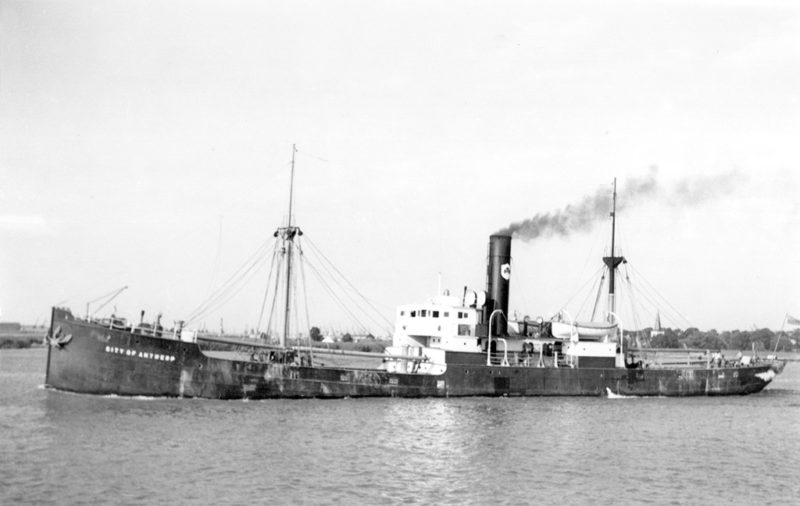
Palgrave Murphy Ltd. played a major part in the formation of ISL, and their City of Antwerp and City of Dublin survived the war. A new City of Waterford was built in 1954 by Travewerft at Lubeck of 620 grt and 915 dwt powered by an Alphen diesel engine giving a service speed of eleven knots.
She traded alongside City of Hamburg of 1,113 grt, built as Aboyne for the Aberdeen, Newcastle and Hull Steam Co. Ltd., and purchased in 1954 as Fair Head from Head Line. A large stevedoring business was built up in Dublin in post-war years employing many dockers and handling much cargo every month. A refrigerated cargo service was introduced in 1965 between Irish and Continental ports. In May 1969, the Limerick Steamship Co. Ltd. and its subsidiary of Shannon Travel amalgamated with Palgrave Murphy Ltd. to become Hibernian Transport. Seven months later, the Limerick to Liverpool service was withdrawn, and after a complex series of events the group went into liquidation at the end of 1970.
Wexford Steamships Ltd. were managed by James J. Stafford at Wexford and were running a fleet of three steam coasters in the inter-war years as Wexfordian of 602 grt built by Earle’s Co. Ltd. at Hull as Fido in 1906, Elsie Annie of 358 grt built by Wood, Skinner & Co. Ltd. of Gateshead as Arrival in December 1904, and J. F. V. of 515 grt built by J.T. Eltringham & Co. Ltd. at South Shields in 1909 as Wheatfield.
James J. Stafford was operating three new coastal cattle carriers under the Irish tricolour in 1941 in Edenvale of 450 grt built in 1938, Kerlogue of 300 grt built in 1938, and Menapia of 500 grt built in 1939.
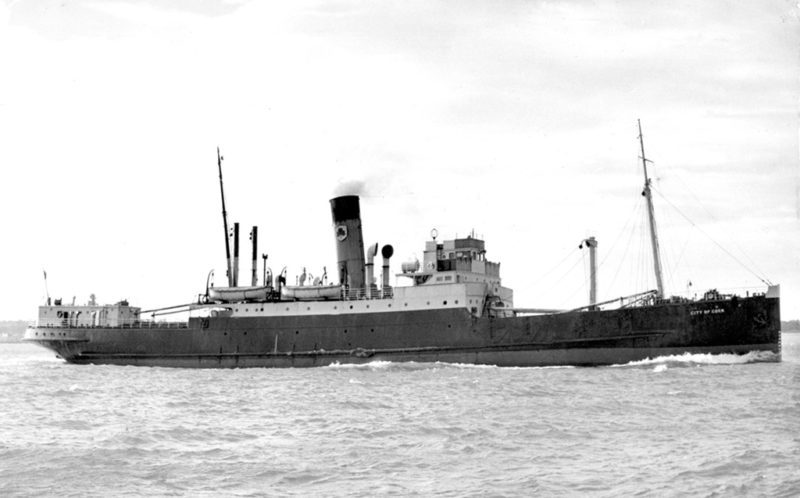
The latter coaster made a very long voyage from Sao Tome in the Gulf of Guinea in West Africa to an Irish port in November 1943 with a cargo of 900 tons of palm oil. Kerlogue was fortunate to have a coal cargo when two unidentified aircraft attacked her with cannon fire. The shells lodged in the coal rather than piercing her hull. Britain denied involvement, but when the coal was discharged shell fragments of British manufacture were found from two Polish manned Mosquito aircraft.
On another occasion on 29th December 1943, she rescued 168 German nationals from a sunken ship. James J. Stafford was one of the first directors of ISL when it was set up in 1941, and large numbers of Wexford mariners were employed later on ISL ships on world-wide voyages.
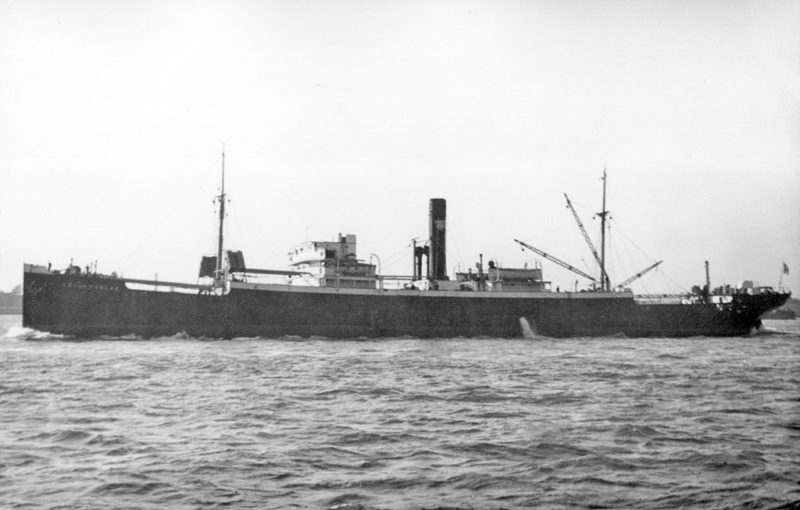
THE ISL WARTIME FLEET OF 15 DEEP-SEA VESSELS
All of the world deep-sea fleet was in great demand in early 1941 with very little to be purchased on the open market. ISL had to resort to buying its first ship at Aviles in Northern Spain in March 1941 after being damaged by German aircraft and its crew had abandoned ship.
The ship had been salvaged from a grounding on rocks by Spanish fishermen and towed into port, who were awarded salvage money of £80,000. Capt. M. Moran with an Irish crew then took charge of the ship, and after repairs, she loaded a full cargo of grain and set sail for Dublin, where she arrived on 1st October 1941, and was renamed Irish Poplar before she sailed on her next voyage on 20th December 1941 for St. John (NB) to load grain.
Ships in very poor condition were acquired from Denmark, Sweden, Palestine, Panama, Jugoslavia and Chile, with two oil burners bareboat chartered from the United States Marine Commission reserve fleet, and three Estonian ships that were in Irish ports after Estonia was annexed by the Soviet Union.
Their crews refused to sail them home to Estonia, and the trio were purchased by ISL. One ship, built for Ropner & Son back in 1895 as Barlby, was purchased on 17th June 1941 at the age of 46 years and needed such extensive repairs that involved two and a half years of work in a dry-dock in a South Wales repair yard.
In fact, she never sailed for ISL during the war, and was requisitioned by the British Ministry of War Transport as Empire Don and sailed until returned to ISL in the summer of 1945 as Irish Hazel. Irish Spruce had also been under repair for almost three years when she finally sailed for Canada on 11th April 1945 to load wheat.
The shipbuilding and ship repair site at Rushbrooke on the east bank of the Lower West Passage at Cork had begun in 1860. When Irish Shipping Ltd. (ISL) was founded in 1941, a wholly owned subsidiary was set up by the Irish Department of Industry and Commerce as Cork Dockyard Ltd. to take over the operation of the Rushbrooke dockyard.
The yard became the Verolme Cork Dockyard in 1959 when Cornelis Verolme took it over, having been attracted by Irish Government financial support, and he later also owned a yard in Brazil to develop Verolme into a worldwide shipbuilding and repair business.
When ISL ships had finished their repairs, their hulls were painted black with red boot topping and buff upperworks, while funnels were black with a white shield bearing the letters ‘ISL’ in red.
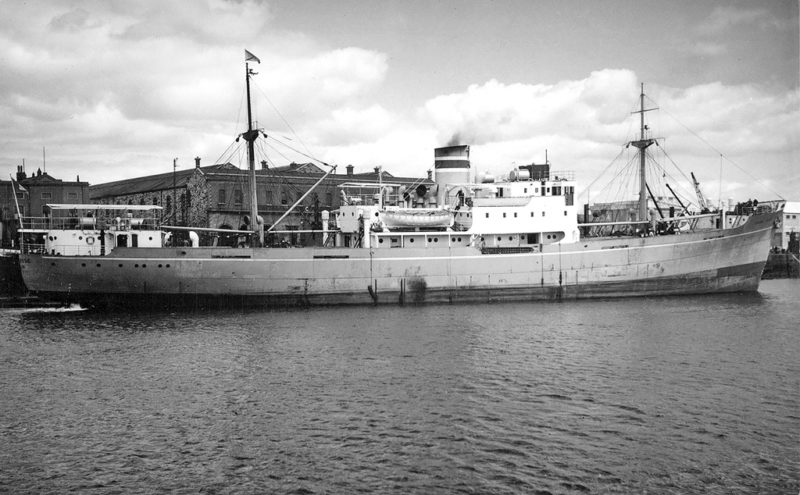
The first ISL war time fleet was acquired quickly to maintain supplies to the Irish people, and the Secretary of Sean Lemass, John Leydon, became the first Chairman of ISL. The ships were as follows:-
- IRISH POPLAR (March 1941-1949) acquired as the Vassilios Destounis from the Greek flag
- IRISH LARCH (28.7.1941-11.1949) acquired as Haifa Trader from Palestine
- IRISH BEECH (13.5.1941-1948) acquired as Cetvrti from Jugoslavia
- IRISH ELM (8.1941-1949) acquired as Leda from Chile
- IRISH FIR (14.10.1941-1949) acquired as Margara from Chile
- IRISH HAZEL (17.6.1941-1943, 1945-1949) acquired as Noemijulia of Panama registry
- IRISH OAK (21.5.1941-15.5.1943) acquired as West Neris from the U.S.A.
- IRISH PINE (21.5.1941-16.11.1942) acquired as West Hematite from the U.S.A.
- IRISH PLANE (26.12.1941-1.2.1947) acquired as Arena of Panama registry
- IRISH WILLOW (3.10.1941-1946) chartered as Otto of Estonia
- IRISH ROSE (12.1.1942-1946) chartered as Mall of Estonia
- IRISH ALDER (12.1.1942-1946) chartered as Piret of Estonia
- IRISH SPRUCE (20.4.1942-1949) purchased as Vicia of Sweden
- IRISH ASH (27.8.1942-1949) purchased as Mathilde Maersk from A.P. Moller of Denmark
- IRISH CEDAR (1943-1945) chartered as Caterina Gerolimich from INCSA of Italy
These fifteen ships were of all types of tramps and in all states of seaworthiness as shipping for sale on the open market was in very scarce supply in early 1941. The biggest of these three island tramps were of overall length of 410 feet, 55 feet in the beam, and 27 feet in depth, with a central bridge deck of length 150 feet, and 1,350 tons of sea water carried on ballast voyages.
Irish Shipping Ltd. had some unusual influences on its commercial operations due to the nature of the savage war at sea, and included marine insurance and ship repair, which it did not necessarily wish to have. A combination of the war, and with ISL ships sailing mostly out of convoy and alone, led to very high insurance premiums, and thus the setting up of its own successful marine insurance business, which it sold to the Insurance Corporation of Ireland after the end of the war.
ISL ships sailed unarmed and alone usually, identifying themselves as neutrals with bright lights and by painting the Irish tricolour and ‘EIRE’ in large letters on both sides of their hulls. However, 20% of seafarers serving on Irish ships died during the war, victims of a war not of their own and attacked by both sides, though predominantly by the Axis powers.

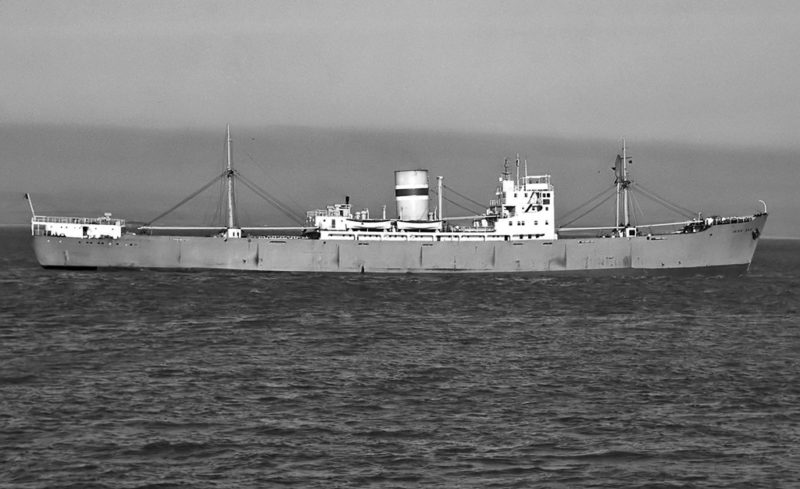
Often, Allied convoys did not stop to pick up survivors, while Irish ships regularly answered SOS signals and stopped to rescue survivors, irrespective of which side they belonged to. Irish ships rescued 534 seamen, and the size of the total of ISL and other Irish shipping company seafarers was never more than 800 men at any one point of time during the war.
ISL ships served on deep sea routes such as the Transatlantic crossings, and followed a route defined for them by the Allies as a line from the Fastnet Rock to the Azores and then along the line of latitude at 38 degrees north. Ships of the other Irish shipping companies e.g. Limerick Steamship Co. Ltd. operated on the ‘Lisbon Route’ importing fruit and wheat from Spain and Portugal, as well as goods transhipped from the Americas. Their route followed the line of longitude at 12 degrees west, while Allied convoys to Gibraltar followed 20 degrees west. U.S. President Roosevelt had established in November 1939, by signing the Fourth Neutrality Act, a limit beyond which American flag ships trading to Europe would not go, by drawing a line from Cape Finisterre in north west Spain to Iceland. Cargoes for Ireland and the Allies were delivered to Lisbon, from where they had to be brought to Northern Europe, and cargoes to America had to be delivered to Lisbon.
Irish ships began their voyage on the ‘Lisbon Route’ by carrying potatoes and vegetables to British ports from Irish ports, then loaded up a British export cargo of coal and carried it to Lisbon, where they backloaded with waiting American cargo such as fertiliser or machinery of all types.
Grain Importers Ltd. was one of seven private enterprise companies set up by the Irish Government to encourage an increase of GDP, which rose from £55 million in 1933 to £90 million by 1938, and the economy was also protected by tariff barriers established during the Anglo-Irish Trade War (1932-1938).
Britain had imposed a tax in 1932 on Irish products e.g. cattle from the Irish Republic were taxed but cattle from Northern Ireland were not. Thus, cattle were smuggled across the border in large numbers, amounting to 100,000 cattle during 1934/35. Two separate agreements were then made to alleviate the worst effects of the trade war, with the ‘Cattle for Coal’ pact of 1935, and the Anglo-Irish Trade Agreement of 1938 which ended the trade war on terms favourable to Ireland. The former Vickers repair yard in the Port of Dublin was reopened in 1940 by the Dublin Port and Docks Board to repair both Irish and British ships.
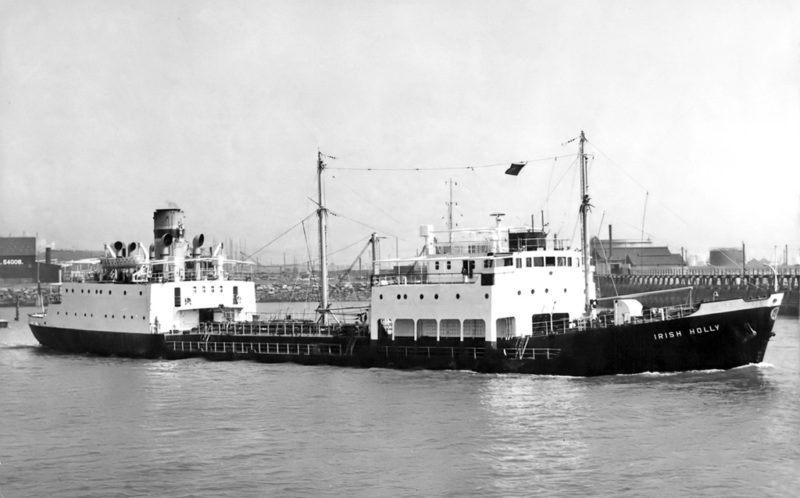
Animal Feed Stuffs Ltd., Fuel Importers Ltd., Oils and Fats Ltd., Timber Importers Ltd., Tobacco Importers Ltd. and Tea Importers Ltd. were the other private enterprise companies set up in Ireland. ISL ships during the war imported 712,000 tons of wheat and grain for Grain Importers Ltd. with half from Canada, 178,000 tons of coal for Fuel Importers Ltd., 24,000 tons of tobacco for Tobacco Importers Ltd., 10,000 tons of timber for Timber Importers Ltd., 5,000 tons of tea for Tea Importers Ltd., while 125,000 tons of general cargo was imported such as 63,000 tons of phosphate fertiliser, 50,000 tons of animal feed stuffs, and smaller quantities of fruit, newsprint and agricultural machinery.
Tea was severely rationed to the lament of the Irish people, who drank as many cups of tea as British people. The production of town gas from imported coal was badly affected as regulations were brought in limiting its use. The figures for the other Irish shipping companies have been lost.
The main export of the Irish Republic during the war was potatoes and agricultural produce as well as cattle and beef to Britain, in return for a steady stream of coal transported in ten colliers to Ireland.
The Irish land area under tillage increased from 1.492 million acres (0.6037 million hectares) in 1939 to 2.567 million acres (1.0388 million hectares) in 1944. This compared favourably with massive acreage under the plough in 1918 during the response during World War I at 2,383 million acres (0.9644 million hectares). Almost three million cattle were exported during the war from Ireland, together with 20,000 tons of beef.
Two ISL ships were lost to U-boats during the war, and Irish Willow was stopped by U-753, which signalled ‘Send Master and ship’s papers’. Capt. Shanks hailed from Belfast and was thus a legal British citizen, and his transfer was considered unwise. Chief Officer Harry Cullen and four crew rowed to the U-boat, saying that the Master was unwell and too elderly to come by boat. He added that it would be St. Patrick’s Day in the morning, and the boat party were treated to schnapps in the conning tower and given an extra bottle of cognac for use on the ship.
Vice Admiral Karl Donitz had issued standing orders to all U-boat commanders on 4th September 1940 to define enemy, neutral and in particular Irish ships, and friendly ships. Ireland forbade the navigation of her territorial waters by warships under threat of internment. This must be carefully and strictly observed by U-boats in an order by Donitz.
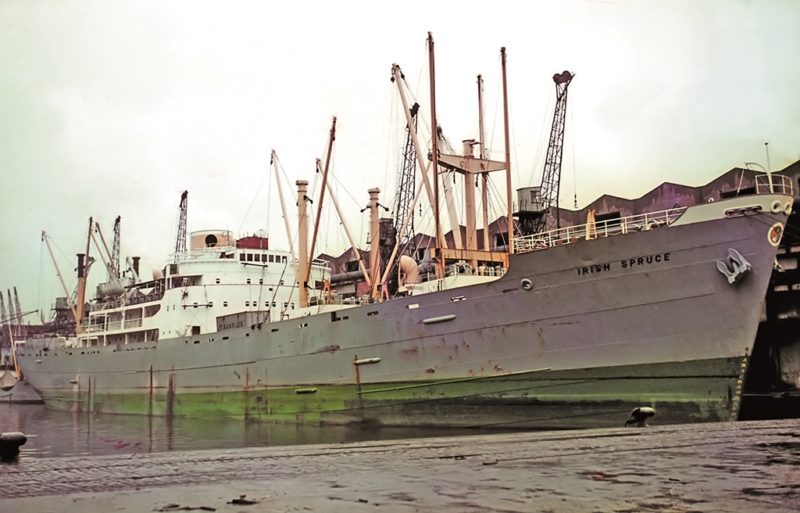
Irish Oak was torpedoed and sunk on 15th May 1943 by U-607 and her commander was mildly reprimanded as ‘An understandable mistake by an eager captain’. She was on a voyage from Tampa in Florida with a cargo of phosphate rock and was sunk in position 47°51′ North, 25°53′ West, all of the crew were picked up by Irish Plane later the same day and landed safely at Dublin.
Irish Pine was torpedoed and sunk near New York on 16th November 1942 by U-608, the first torpedo having missed and the second exploded with great force aft. There were no survivors from her crew, who had sailed from Dublin for Tampa on 29th October 1942, and had last been in contact by radio on 13th November 1942.
At the end of the war, all who served on Irish flag ships for over six months received the ‘Emergency Service Medal’, and a Seafarers Stone Memorial was erected in the Ringsend area of Dublin. Annual commemorations are held in Dublin on the third Sunday of November, with the Cork commemoration on the fourth Sunday of November in the former offices of the White Star Line.
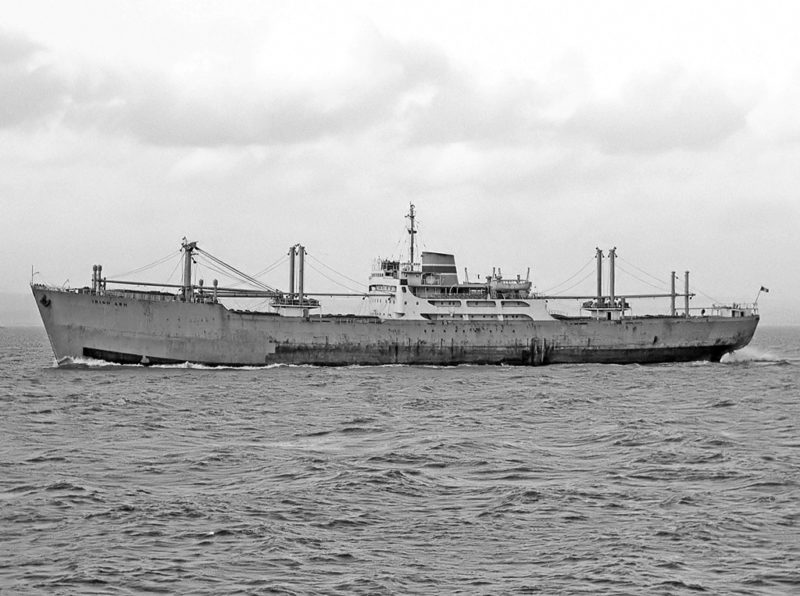
ISL FLEET IN POST-WAR YEARS
Ships were chartered in to ISL after the loss of their largest ship Irish Plane on 1st February 1947 when she ran aground at Kelly’s Cove, six miles east of Roche Point at Ballycotton in County Cork after her steering gear had failed while on a voyage from Philadelphia to Dublin, Swansea and Cork with general cargo. She was abandoned as a total loss and sold for breaking up.
ISL then placed orders for seven new dry cargo ships in 1948 under the Phase 1 rebuilding scheme with British yards at a cost of £1.7 million, as most of the original ISL tonnage purchased during the war was in very poor condition. They were completed with black hulls, soon changed to light grey hulls, and with yellow funnels with a green band between two narrow white bands. The new ships were:-
- IRISH ROSE (2) (1948-1954) Gray, West Hartlepool, 1,923grt, 2,21 dwt
- IRISH WILLOW (2) (1948-1954) Gray, West Hartlepool, 1,923grt, 2,210dwt
- IRISH PINE (2) (1948-1965) Readhead, South Shields, 5,048grt, 7,575dwt
- IRISH OAK (2) (1949-1967) Readhead, South Shlelds, 5,077grt, 7,575dwt
- IRISH CEDAR (2) (1949-1959) Gray, West Hartlepool, 5,627grt, 8,700dwt
- IRISH PLANE (2) (1949-1960) Gray, West Hartlepool, 5,368grt, 8,870dwt
- IRISH HAZEL (2) (1950-1960) Gray, West Hartlepool, 5,366grt, 8,840dwt
The company office was now at Aston Quay in Dublin with, in the mid 1950s, Capt. J. O’Neill as joint manager with L.S. Furlong, six directors, and James J. Stafford of Wexford Steamships Ltd. as Chairman. The five larger dry cargo ships had accommodation for a dozen First Class passengers, five holds and five hatches served by a dozen derricks and a heavy lift derrick. The Phase 2 and Phase 3 rebuilding schemes comprised the ships:-
- IRISH ELM (2) (1953-1963) Gray, West Hartlepool, 5,828grt, 8,920dwt, part refrigerated
- IRISH HEATHER (1952-1964) Goole Shipbuilding & Repair, 1,057grt, 1,398dwt, collier
- IRISH FERN (1954-1964) Liffey Dockyard Ltd., Dublin, 1,113grt, 1,374dwt, collier
- IRISH ROSE (3) (1956-1969) Ailsa Shipbuilding Ltd., Troon, 1,749grt, 2,002dwt, Great Lakes
- IRISH WILLOW (3) (1956-1969) Ailsa Shipbuilding Ltd., Troon, 1,743 grt, 1,975 dwt, Gt. Lakes
- IRISH FIR (2) (1956-1969) Liffey Dockyard Ltd., Dublin, 1,752grt, 1,945 dwt, Great Lakes
- IRISH HOLLY (1954-1967) Gray, West Hartlepool, 2,940grt, 3,350dwt, tanker
- IRISH LARCH (2) (1956-1968) Gray of West Hartlepool, 8,283grt, 10,695dwt
- IRISH POPLAR (2) (1956-1972) Cammell Laird, Birkenhead 8,023grt, 9,452dwt
- IRISH ALDER (2) (1957-1970) Gray, West Hartlepool, 8,226grt, 10,735dwt
- IRISH ASH (2) (1958-1970) Gray,West Hartlepool, 8,269 grt, 10,650 dwt
- IRISH MAPLE (1957-1968) Gray of West Hartlepool, 8,288grt, 10,693dwt
- IRISH SPRUCE (2) (1957-1972) Cammell Laird, Birkenhead, 8,044grt, 9,710dwt
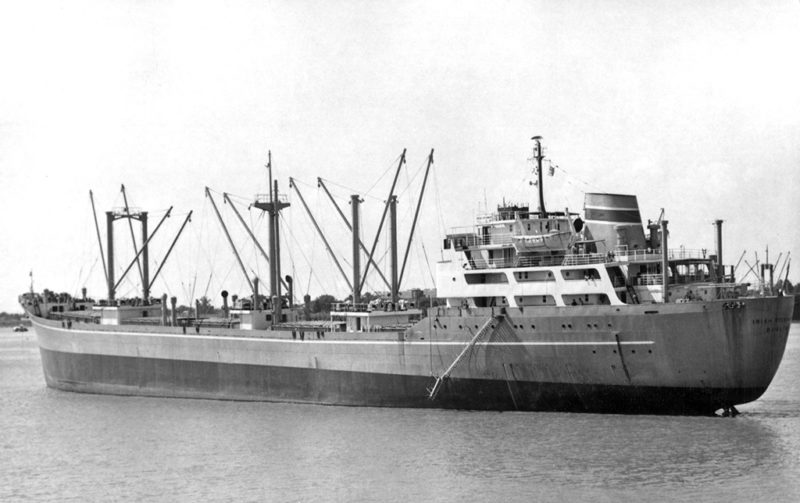
The propelling machinery of the general cargo ships of the Phase I rebuilding scheme were triple expansion steam reciprocating engines aided by an exhaust low pressure turbine. Four motorships with five-cylinder Doxford oil engines were then completed as Irish Larch (2) of 1956, Irish Alder (2) of 1957, Irish Maple of 1957, and Irish Ash (2) of 1958. The smaller ships comprising two colliers and three vessels trading to the Great Lakes were fitted with six cylinder or nine cylinder British Polar Ltd. of Glasgow diesel engines. Two steam turbine propelled via double reduction gearing to a single screw shaft general cargo ships were completed in 1956/57 as Irish Poplar (2) and Irish Spruce (2). This pair were the last steam powered vessels in the ISL fleet as the Doxford and later other diesel engines were more fuel efficient.
In 1960, eighteen vessels were being traded at reasonable freight rates, with Irish Oak (2) making a voyage in April 1960 under Capt. John Poole (later Commodore) to arrive as the first ship at the head of the Great Lakes at Duluth of the new navigation season, and he was awarded the Freedom of the City of Duluth. Capt. Poole also made Transatlantic voyages to Quebec, Montreal, Brookly, Norfolk, Wilmington, Charleston, Savannah, Brownsville and other American ports. He made three Round the World voyages in command of Irish Spruce (2), Irish Elm (2) and Irish Poplar (2) in the early 1960s. Irish school children were encouraged to follow the voyages of ISL ships, with the help of The Irish Times (Coras Trachtala).
However, by 1963 ISL homeward loaded Transatlantic voyages with grain were being quoted at 16 shillings per ton, with double that figure needed to cover voyage operating costs. One quarter of ISL business was in the Transatlantic grain trade, with 75% of voyages carrying cargoes from one foreign port to another foreign port. At the Annual General Meeting in Dublin on 31st March 1963, an operating loss was announced, with operating expenses at £3.549 million and freight and charter revenue in at only £2.687 million. It was the worst year for ISL since the Suez crisis of seven years previously, with freight rates in some commodities dropping to their lowest rates for 25 years. Operating expenses were Repairs and Depreciation (35%), Crew wages (19%), Stevedoring (11%), Port charges (8%), Bunkers (7%), Stores, insurances, office expenses etc (20%).
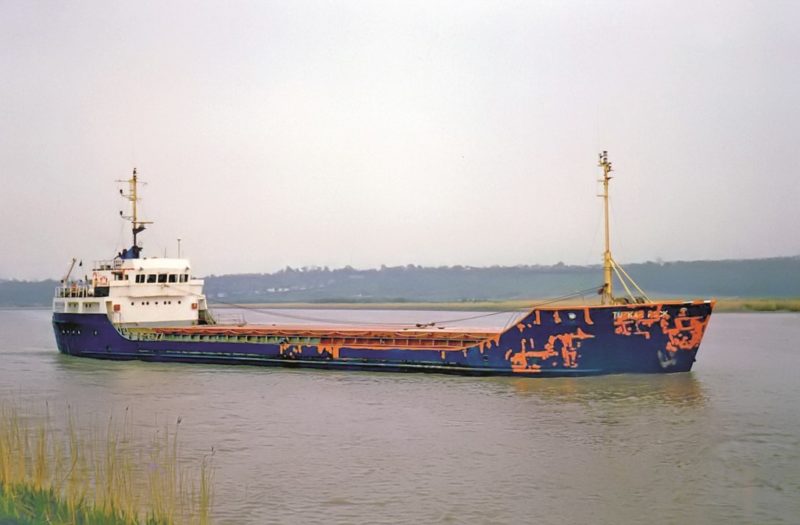
The ISL fleet in 1964 was one of twenty ships of 200,000 dwt, and included the new tankers Irish Hawthorn and Irish Blackthorn of 18,050 dwt from the Fairfield yard in Govan in 1958/59, and four engines aft bulk carriers of 15,500 dwt, Irish Sycamore, Irish Rowan, Irish Cedar (3) and Irish Plane (3). Three of the bulkers were built by Verolme at Heusden in Holland and at the Verolme Cork Dockyard, and one by Gray at West Hartlepool, during 1961/63. This quartet traded worldwide in the Atlantic and Pacific Oceans for between twelve and fourteen years for ISL with cars, steel products, grain and other cargoes on charter to Nedlloyd, Trans World Shipping, Retla Inc. of San Pedro (California), Random Inc. of New York and others, and sometimes sailed homeward with phosphates from Casablanca to Dublin.
Irish Sycamore and Irish Rowan were equipped with a 35 ton heavy lift derrick on a pole mast ‘midships and eleven other derricks, whereas Irish Cedar (3) and Irish Plane (3) had no heavy lift derricks but ten smaller derricks of five ton capacity on three sets of double posts. The quartet had five holds and five hatches, and grain capacities of 705,000 cubic feet, and carried 4,750 tons of water ballast in combination double bottoms, side tanks and topsides tanks on ballast voyages.
On 25th June 1963, the crews of Irish Sycamore and her sister Irish Plane (3) were cheered when they passed close by each other when some 700 miles North of Honolulu, one sailing east and the other sailing west. Irish Sycamore suffered the worst peacetime fire disaster for ISL with the loss of five seafarers on 23rd July 1965 at the Public Commodity Wharf in New Orleans while discharging a cargo of steel products and lubricating oil from Japan. She was extensively damaged and repaired at New Orleans before loading a cargo of grain at Houston for discharge in Indian ports. In July 1966, she began a time charter to Nedlloyd and loaded grain at Canadian ports for the relief of famine in India. She had to wait two months in the Hooghly river at Calcutta before discharge of the grain could begin. In June 1967, during the open summer season in Hudson Bay, she discharged prefabricated houses, oil tanks, and steel equipment and other supplies at Port Churchill for remote outposts in the North West Territories of Canada on charter to Trans World Shipping.
In 1967, the ISL North Atlantic trade was run as a liner trade jointly with Manchester Liners Ltd., and the company reported a reasonable profit, the first for ten years. Irish Elm (3) with seven holds and seven hatches was completed by the Verolme Cork Dockyard Ltd. (Yard 746) as a bulk carrier of 37,775 dwt in January 1968. She was equipped with four electro-hydraulic cranes of eight tons capacity, had a grain capacity of 1.652 million cubic feet, and had a water ballast capacity of 13,920 tons in combination double bottom tanks, side tanks and topside tanks. She was equipped with a six cylinder M.A.N oil engine by Verolme at Ijsselmonde to give a service speed of 15.5 knots. This engine was designed for unmanned operation in open waters at night, but this was seldom if ever achieved as the control electronics were germanium based rather than silicon based as normal and the most suitable semiconductor. The germanium based controls resulted in high ambient temperatures in the engine room and had to be constantly watched. She had pontoon decks fitted in Hamburg for the carriage of cars from Japan to the U.S.A. and to Europe. A further mismatch of technology was the use of steam driven reciprocating feed pumps for the exhaust gas boiler. This was controlled by a pneumatic valve, but the system also required constant attention to ensure correct operation at all times.
Irish Elm (3) obtained two charters each of five years duration during her ten year career with ISL. After her maiden voyage to Pepel to load iron ore for Rotterdam, she then loaded grain at New Orleans for Rotterdam, and dry-docked at Hamburg to have car decks fitted by Blohm & Voss. The first five year charter was to Olaf Wallenius of Stockholm, loading an average of 2,820 cars each voyage. The second five year charter from September 1973 was to the Yamashito-Shinnihon Steamship Company of Japan. On one voyage in June 1976, she transported empty containers from Hamburg to Kobe via the recently reopened Suez Canal, and her last voyage for her Japanese charterer was with fertiliser loaded at Houston (Texas) for Fredericia in Denmark, where she arrived on 23rd February 1979. She had transported a total of 1.468 million tons of cargo during her ISL career, plus 127,687 cars. She was then sold to Greeks in 1979 and renamed Pelopidas, but within two years she was sold on to COSCO of China and renamed Min Yun Hai.
In 1970, a fleet of a dozen ships was being operated by ISL, with two new geared self-discharging bulk carriers equipped with twin 25 ton capacity Munck gantry cranes in Irish Star and Irish Stardust, with one each from Cammell Laird at Birkenhead and from the Verolme Cork Dockyard.
They were chartered to the Star Bulk Consortium of Norway for eight years and wore their funnel colours. They had five holds of 64, 80, 80, 80 and 80 feet in length and five hatches, and were powered by twin twelve cylinder M.A.N. diesel engines geared to a single screw shaft to give service speeds of 15.5 knots.
The turbine propelled general cargo vessel Irish Spruce (2) completed in 1957 came to grief on the Quita Sueno Bank off Nicaragua on 27th January 1972 while on a voyage from Callao in Peru to New Orleans with phosphates. She broke her back and was declared a total constructive loss, and when her sister Irish Poplar (2) was sold a year later, the ISL fleet became one of only motorships.
ISL moved to a brand new office complex on 15th March 1974 at Merrion Hall at Sandymount in Dublin from the previous offices at Aston Quay in Dublin occupied since the end of the war.
The new offices were located on the south side of the Liffey in a financial services sector near the Merrion Square, the Grand Canal, the National Library and the National Print Museum.
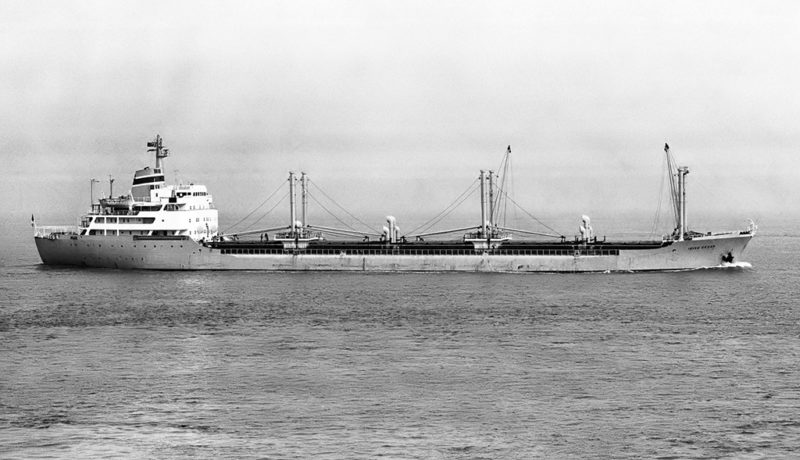
CELTIC BULK CARRIERS CONSORTIUM
Since ISL had been founded in 1941, it had begun to work closely with Reardon Smith Line of Cardiff. Many joint ventures and enterprises had been made during the ensuing 32 years, whether profitable or not with profits shared, until four ‘Cardiff’ class bulk carriers of 16,700 grt and 25,700 dwt were delivered by Upper Clyde Shipbuilders on the Clyde at two month intervals as Irish Pine (3), Irish Maple (2), Irish Oak (3) and Irish Larch (3) in 1973. ISL and Reardon Smith Line had ordered eleven of the ‘Cardiff’ class, with the septet of Reardon Smith Line also partly crewed by Irish seafarers. This class of eleven bulkers were very reliable in service and earned good profits on world wide training. They were on the following voyages in October 1978:-
- IRISH PINE (3) Rotterdam to Niigata via Panama Canal
- IRISH MAPLE (2) Antwerp to Tacoma and Vancouver
- IRISH OAK (3) Rotterdam and Antwerp to San Francisco
- IRISH LARCH (3) Hong Kong and Kaohsiung to Rotterdam
- VANCOUVER CITY Antwerp to Djibouti and Shanghai
- PRINCE RUPERT CITY Humboldt Bay (California) to London via Panama Canal
- VICTORIA CIT Galveston and Houston to London
- FRESNO CITY Suzaki (Japan) to Port Kembla
- NEW WESTMINSTER CITY New Orleans to Rotterdam
- TACOMA CITY Tees and Antwerp to Los Angeles
- PORT ALBERNI CITY Singapore and Penang to Liverpool
I was fortunate to see two ‘Cardiff’ class bulkers of ISL arrive in the Tyne with packaged timber within a week of each other in February 1981. Irish Pine had sailed from Vancouver on New Year’s Day and after a part discharge on the Thames arrived in the Tyne on 11th February. Irish Larch had sailed from Vancouver on 8th January and arrived in the Tyne to take the vacated berth of her sister on 19th February.
During the 1970s, ISL also operated seven ships on long term time charter in addition to its owned ships. This septet operated in the steel trades from Europe to the U.S.A., and in the lumber trades from the West Coast U.S.A. and Canadian ports to Europe.
Equity rights in four of this septet were retained for renewal of charters during the 1980s decade. Six smaller vessels were also managed by ISL during the 1970s and 1980s in:-
Coal Distributors Ltd.
Fastnet Rock, Tuskar Rock built in 1979 of 1,159 grt and 1,720 dwt built by Hancock of Pembroke on dimensions of overall length 68.03 metres, moulded beam of 11.6 metres, and moulded depth of 4.3 metres.
R. & H. Hall Ltd.
Daunt Rock, Skellig Rock built during 1976/78 of 797 grt and 1,255 dwt were also built by Hancock of Pembroke.
Lough Beltra
The stern trawler of 180 grt was completed in Holland in 1976 for the National Science Council of Ireland for management by ISL, as was the twin masted sail training vessel Asgard II of 93 grt built in March 1981 by James Tyrrell of Arklow for the Coiste An Asgard.
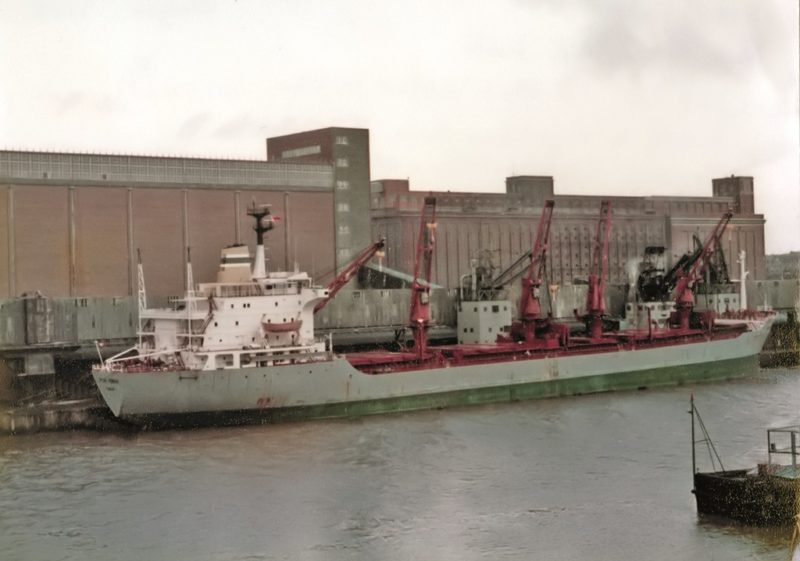
ISL FINALE
Two further bulk carriers of the same size as the ‘Cardiff’ class were delivered in 1976/77 by Japanese shipbuilder Hayashikane Zosen at Shimonoseki as Irish Rowan (2) and Irish Cedar (4). ISL took delivery of its final bulk carrier, a Panamax size vessel of 72,000 dwt in 1983 from the Verolme Cork Dockyard in Cork as Irish Spruce (3). The ordering and building of the vessel were the subject of much controversy with many people feeling that the Irish Government put undue pressure on ISL to place the order to keep the yard open.
On the 31st March 1984, at the 43rd Annual General Meeting for the year 1983/84, the Chairman W.A. O’Neill said that the Group had sustained further financial losses during the year ending 31st March 1984 of £22.376 million compared to a loss of £6.817 million for the year 1982/83. After taking into account all provisions including a book loss on the disposal of the Group interest in the Insurance Corporation of Ireland, the total deficit was £34.236 million compared to £14.001 million in the year 1982/83. The Panamax bulker freight rates had dropped from over $20,000 per day in 1981 to under $5,000 per day in 1984. On 14th November 1984, the Irish Government placed ISL into liquidation, with Maurice Tempany, a senior partner in Ernst & Young appointed as the official liquidator.
Four bulk carriers still owned by the company, Irish Maple (2), Irish Rowan (2), Irish Cedar (4) and Irish Spruce (3) were arrested as they entered their next port of call and all four were eventually sold off. Irish Rowan (2) ended her final voyage for ISL when she arrived at Madras to discharge cargo on 16th September 1984.

This last quartet had all found new buyers by early 1986, with the Panamax bulker Irish Spruce (3) the last to leave the fleet. ISL had been a leading world-wide shipowner for 45 years from 1941 to 1986.
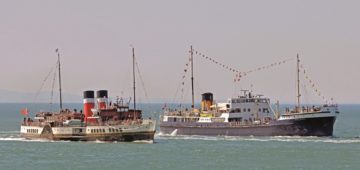



Comments
Sorry, comments are closed for this item